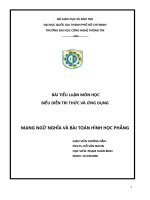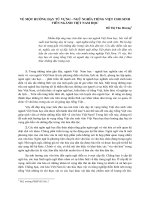En11 từ vựng ngữ nghĩa học bài 5
Bạn đang xem bản rút gọn của tài liệu. Xem và tải ngay bản đầy đủ của tài liệu tại đây (108.57 KB, 4 trang )
<span class="text_page_counter">Trang 1</span><div class="page_container" data-page="1">
<b>HANOI OPEN UNIVERSITY</b>
<b>MID -TERM TEST ONLEXICOSEMANTICS</b>
FOR STUDENTS OF ENGLISH (No 3)Subject Code: EN11
Full name:
Date of birth:
Group:
<b>I. Answer the following questions: (40 points) </b>
1. What are grammatical morphemes? Their typical features? Give some examples.2. What are derivational morphemes? What are the productive and non-productiveprefixes? Give some examples.
(The file sent will be named after each student’s name. Plagiarism will lead to failure)1. Grammatical morphemes give information about the grammatical structure, andconcern function of lexical items. Free grammatical morphemes are most frequent
<i>words in English, e.g.: and, but, by, in, on, not, the, a, that, it, me, etc. Bound</i>
grammatical morphemes are inflectional affixes, give grammatical informationrelevant to the interpretation of the sentence and give different forms of a singlelexical morphemes.
2. Derivational morphemes are far more numerous than inflectional morphemes.They allow productivity (involved in the coining of new words). They can beprefixes or suffixes. The derivational suffixes usually, but not always change word
<i>class, while prefixes usually don’t. For example: vapor => vaporize; count =>countess. Productive prefix is the prefix that is currently used in the derivation ofnew words. For example, the prefix non- is a productive prefix, as demonstrated inthe following new coinage: the only non-upended chair in the ransacked room. An</i>
unproductive prefix is a derivational prefix which is no longer used to form new
<i>words. For example: anthropo- in anthropobiology; contra- in contradistinguish.</i>
</div><span class="text_page_counter">Trang 2</span><div class="page_container" data-page="2"> illegal, a. => not legal, not complying with laws retype, v. => type words again
old-womanish, a. => having personality of a woman disrespectable, a. => not deserving respects
inexpensive, a. => not expensive
unladylike, a. => not similar to a lady’s personality disorganise, v. => disrupt the organization of something renew, v. => extend something
eatable, a. => can be eaten
<i><b>II. Explain the difference between the meanings of the following words </b></i>
watery – waterish => watery: resembling water; waterish: slightly resembling water embarrassed – embarrassing => embarrassed: feeling shy, ashamed;embarrassing: causing shyness, shame
manly - mannish => manly: resembling a male; mannish: (a woman that)acts like a male
distressed – distressing => distressed: feeling upset; distressing: causing upset
respected – respectful - respectable => respected: treated with respect; respectful: showing respects; respectable: worthy of respects;
exhausted – exhausting => exhausted: feeling tired; exhausting: causing tiredness
bored - boring => bored: feeling unhappy because something is not
</div><span class="text_page_counter">Trang 3</span><div class="page_container" data-page="3">interesting; boring: not interesting
touchy - touched – touching => touchy: irritable; touched: grateful, sympathetic for sth; touching: causing sadness, empathy
<i><b> III -phobia (fear or hatred of) -cide (killer, killing) -gamy (marriage) Put each of the above suffixes in its correct place in the sentences below.</b></i>
Those rose-bushes need protection. Spray them with insecticide.
He gets very tense and nervous in enclosed spaces like lifts and the underground. He suffers from claustrophobia.
The custom of having more than one wife or husband is known as ‘polygamy’. Some people, and some animals, are terrified of water. This aversion is known as
aquaphobic.
His problems overwhelmed him and he finally committed suicide.
When he was arrested and charged with biocide, both his wives stood by him. His Anglophobia comes from some bad experiences he had in England. Following the man's death, his wife was charged with homicide.
<b>IV. Explain the meanings of the following words and phrases. </b>
Germicide => Substance that kills germs
Xenophobia => Hatred towards people from other countries Patricide => Killing father
A monogamous society => Where people only marry one another Fratricide => Killing brother
Agoraphobia => Fear of crowded places
<i><b>V. Fill in the gaps with: -maniac (obsessed person) -phile (lover of) or -monger (dealer </b></i>
<i>in) </i>
A person who makes and exploits war is called a warmaniac.
He has always been a bibliomonger and has amassed a vast collection of books
</div><span class="text_page_counter">Trang 4</span><div class="page_container" data-page="4">over the years.
He has a shop selling pots and pans, tools and other metal goods. He's anironmonger.
He's unbelievably self-centred and arrogant. He's a complete egophile. She loved the year she spent in Italy and has been an Italophile ever since.
Some journalists are perfectly honest and well-meaning but she just makes a profitfrom gossip and rumour. She’s just a cheap scandalphile.
A kleptomaniac is a person who has a compulsive desire to steal.
His fondness for drink became an addiction, and his doctor says he's now adipsomaniac.
</div>








